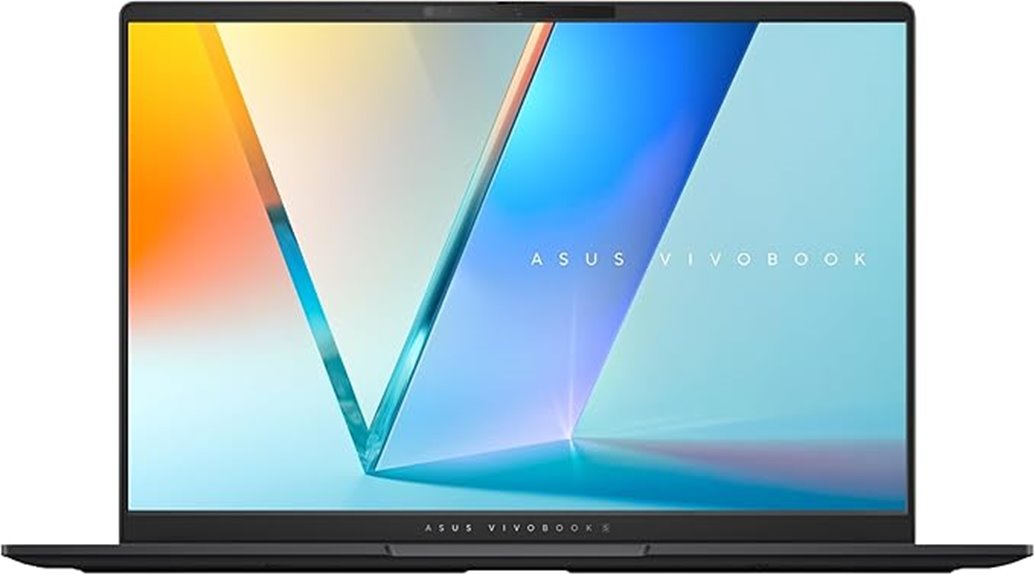Best Laptop for Chemical Engineering (Top 5 Picks for 2025)
If you’re a chemical engineering student in 2025, you’ll want a laptop that meets your demanding needs. Consider top picks like the Apple 2024 MacBook Pro with M4 Chip for power and display quality, or the Acer Swift X 14 for exceptional graphics performance. The Apple 2025 MacBook Air and ASUS Vivobook S 14 offer great portability. Don’t forget the Samsung Galaxy Book4 Pro for seamless multitasking. Keep exploring to find the best fit for your academic journey!
In the interest of full disclosure, we would like to inform you that some links on our website are affiliate links. By clicking on these links and completing a purchase from our partners, we may receive a nominal commission at no extra cost to you. Rest assured, our affiliate partnerships do not compromise the integrity of our editorial content or product evaluations. For further clarification, kindly refer to our comprehensive affiliate disclosure.
Table of Contents
What Are the Best Laptop for Chemical Engineering to Buy This Year?
Here are my top picks for the best laptop for chemical engineering, you can consider this year.
Apple MacBook Pro Laptop with M4 Chip
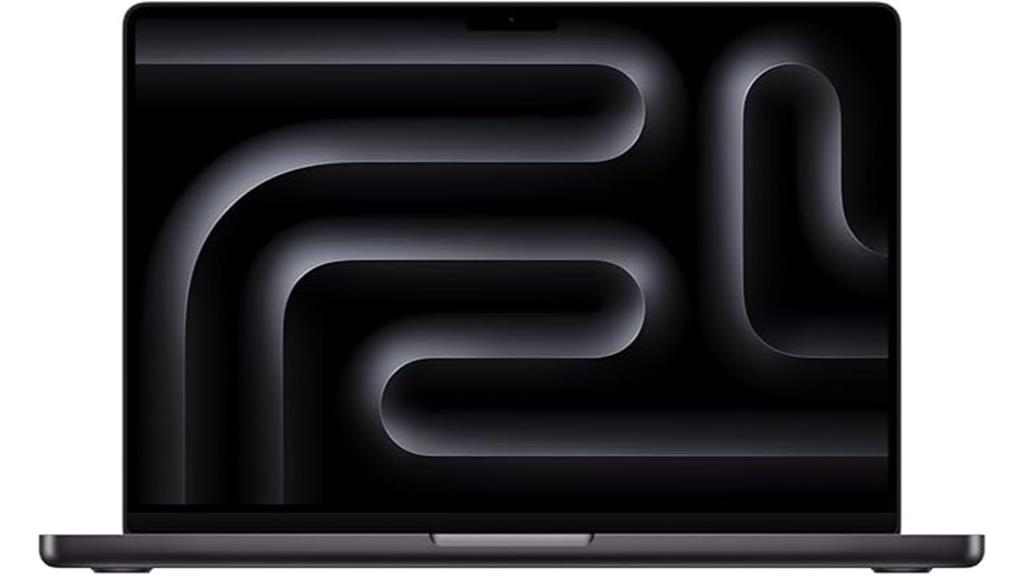
The Apple 2024 MacBook Pro with the M4 chip is an excellent choice for chemical engineering students who need powerful performance for multitasking and demanding applications. With its 10-core CPU and GPU, you’ll experience exceptional speed while running productivity and pro apps. The 14.2-inch Liquid Retina XDR display offers stunning visuals, boasting peak brightness of 1600 nits and a contrast ratio of 1,000,000:1. Plus, the all-day battery life means you can work seamlessly whether plugged in or on the go. It’s also compatible with essential software like Microsoft 365 and Adobe Creative Cloud, making it a top pick for your studies.
Best For: The Apple 2024 MacBook Pro with M4 chip is best for chemical engineering students who require high performance for demanding multitasking and software applications.
Pros:
- Exceptional speed with a 10-core CPU and GPU for running productivity and pro apps efficiently.
- Stunning 14.2-inch Liquid Retina XDR display with peak brightness of 1600 nits for impressive visuals.
- All-day battery life enabling seamless work whether plugged in or on the go.
Cons:
- Higher price point compared to other laptops in the market.
- Limited upgrade options for RAM and storage post-purchase.
- May not be fully optimized for all niche engineering software compared to Windows alternatives.
Acer Swift X 14 Laptop (SFX14-72G-77NJ)
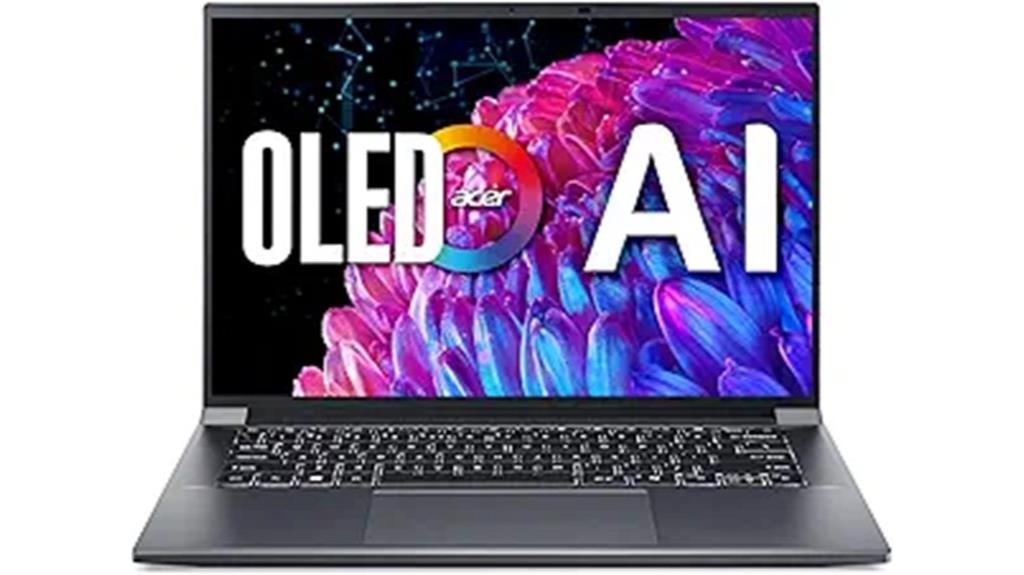
Designed for the demanding needs of chemical engineering students, the Acer Swift X 14 Laptop (SFX14-72G-77NJ) boasts an Intel Core Ultra 7 processor paired with an NVIDIA GeForce RTX 4060 GPU. This powerhouse ensures smooth performance for graphically intense software, while the 14.5-inch OLED display delivers stunning visuals at 2880 x 1800 resolution. With 16GB LPDDR5X memory and a 1TB SSD, multitasking is effortless. The AI features, including a dedicated Copilot Key, enhance your productivity, while the 1080p webcam and advanced audio tools improve collaboration. You’ll find this laptop perfectly suited to tackle your engineering challenges with ease.
Best For: The Acer Swift X 14 Laptop is best for chemical engineering students and professionals who require powerful performance and advanced graphics capabilities for demanding software applications.
Pros:
- High-performance Intel Core Ultra 7 processor and NVIDIA GeForce RTX 4060 GPU ensure smooth operation for graphically intensive tasks.
- 14.5-inch OLED display with high resolution and color accuracy provides an immersive visual experience.
- Generative AI features and enhanced collaboration tools streamline productivity and communication.
Cons:
- The laptop may be relatively expensive compared to other models with less powerful specifications.
- The 14.5-inch size might not be suitable for users who prefer larger screens for extensive multitasking.
- Limited upgradeability options due to soldered memory and SSD configurations.
Apple 2025 MacBook Air 15-inch Laptop with M4 Chip
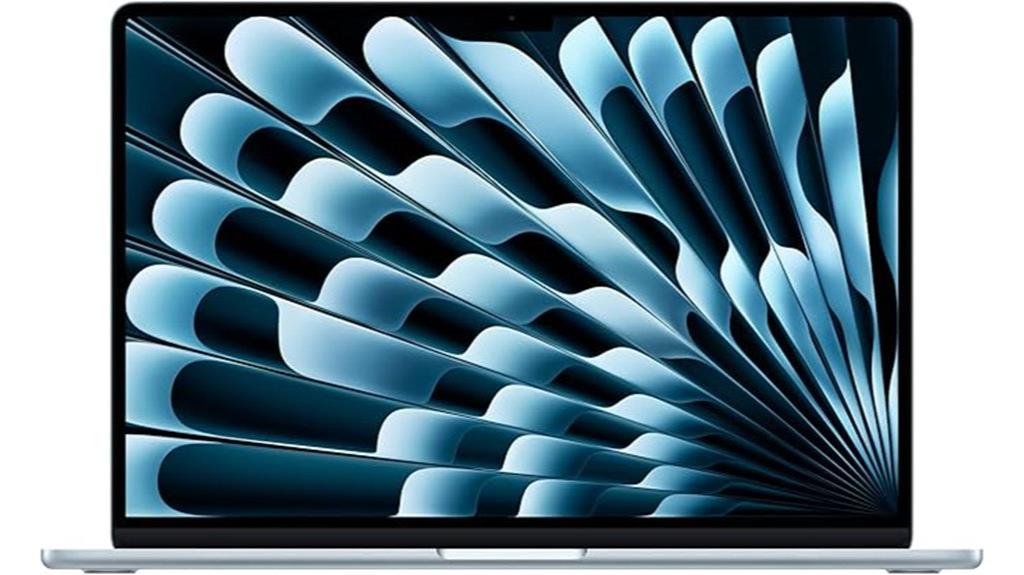
For chemical engineering students seeking a powerful and portable laptop, the Apple 2025 MacBook Air 15-inch with the M4 chip stands out with its impressive performance and battery life. You’ll enjoy seamless multitasking, video editing, and even gaming thanks to the enhanced speed of the M4 chip. The stunning 15.3-inch Liquid Retina display showcases vibrant colors and sharp details, perfect for your project presentations. Plus, the 12MP Center Stage camera and Spatial Audio ensure your virtual meetings are top-notch. With robust connectivity options and Apple’s privacy features, this laptop is designed to elevate your academic experience.
Best For: Chemical engineering students who need a powerful and portable laptop for multitasking, video editing, and gaming.
Pros:
- Enhanced performance with the M4 chip allows for seamless multitasking and efficient handling of demanding applications.
- Stunning display with a 15.3-inch Liquid Retina screen, offering vibrant colors and sharp detail, ideal for presentations and design work.
- Robust connectivity options, including Thunderbolt 4 ports and Wi-Fi 6E, ensure compatibility with various devices and peripherals.
Cons:
- Higher price point compared to other laptops in its class, which may be a consideration for budget-conscious students.
- Limited upgradeability as MacBook Air models typically have soldered components that cannot be upgraded post-purchase.
- Weight may be slightly heavier than ultra-portable alternatives, making it less ideal for students who prioritize ultra-lightweight options.
ASUS Vivobook S 14 OLED Slim Laptop (M5406WA-DS76)
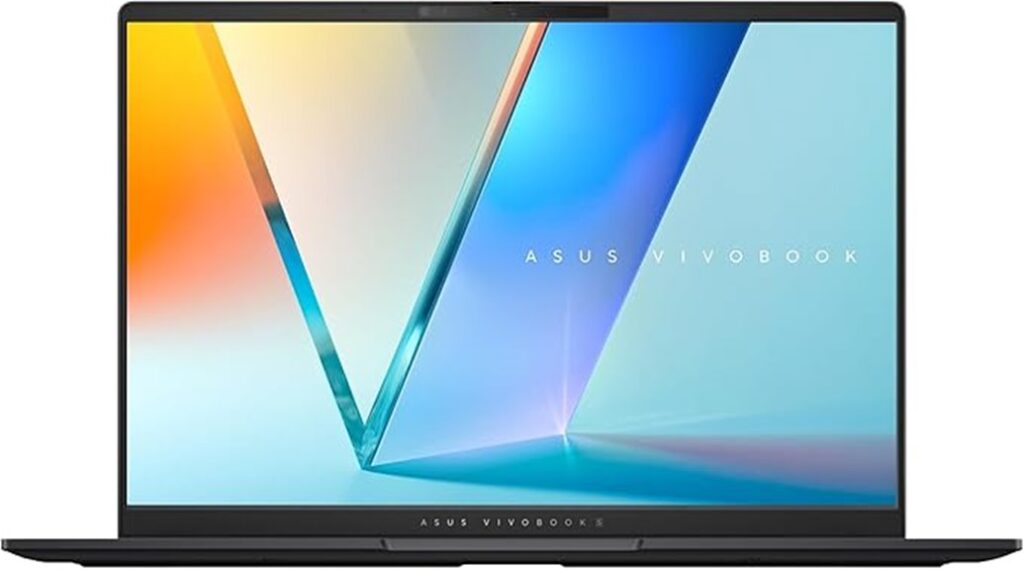
If you’re a chemical engineering student in need of a powerful, portable laptop, the ASUS Vivobook S 14 OLED Slim Laptop (M5406WA-DS76) is an excellent choice. It packs an AMD Ryzen 9 365 processor with 10 cores, 24GB RAM, and a 512GB SSD, ensuring smooth performance for demanding applications. The stunning 14” 3K OLED display features a 120Hz refresh rate and 600nits peak brightness, making your visuals pop. At just 0.63” thick and 2.87 lbs, it’s easy to carry around. Plus, the customizable RGB backlit keyboard enhances your typing experience. Stay connected with multiple USB options for added convenience.
Best For: The ASUS Vivobook S 14 OLED Slim Laptop is best for chemical engineering students who need a powerful and portable device for demanding applications.
Pros:
- Exceptional performance with AMD Ryzen 9 365 processor and 24GB RAM for multitasking.
- Stunning 14” 3K OLED display with high brightness and color accuracy for crisp visuals.
- Lightweight and slim design, making it easy to carry for on-the-go use.
Cons:
- Limited storage capacity of 512GB may require external storage for large projects.
- The RGB backlit keyboard may not appeal to all users and could be seen as a gimmick.
- Higher price point compared to other laptops with similar specifications.
Samsung Galaxy Book4 Pro Business Laptop (NP944XGK-KG4US)
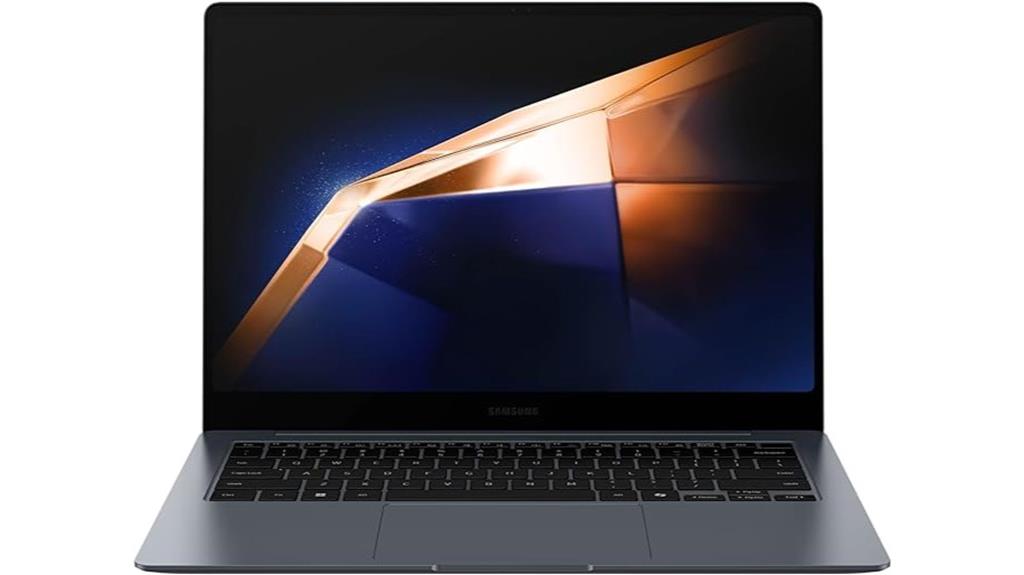
The Samsung Galaxy Book4 Pro Business Laptop (NP944XGK-KG4US) stands out for its impressive 32GB LPDDR5 RAM, making it an excellent choice for chemical engineering students who juggle multiple demanding applications. Powered by the Intel Core Ultra 7 processor and featuring a stunning 14-inch 3K AMOLED touchscreen, this laptop ensures crisp visuals for your projects. Weighing only 2.71 lbs, it’s incredibly portable. With 8 hours of battery life and fast charging, you won’t be left powerless during long study sessions. Its various connectivity options, including Thunderbolt 4 and HDMI, enhance your productivity. Overall, it’s a powerful tool for your academic journey.
Best For: The Samsung Galaxy Book4 Pro is best for professionals and students who require a powerful, portable laptop for multitasking and high-performance applications.
Pros:
- Exceptional 32GB LPDDR5 RAM for seamless multitasking and handling demanding applications.
- Stunning 14-inch 3K AMOLED touchscreen for vibrant visuals and enhanced clarity.
- Lightweight design at just 2.71 lbs, making it easy to carry for on-the-go productivity.
Cons:
- Higher retail price of $1749 compared to competitors with similar specifications.
- Limited RAM upgrade options in select regions, capping at 16GB in the US, Canada, and UK.
- Perceived lower quality of the OEM SSD from Western Digital for the price point.
ALSO READ: Best Laptops for Trading Forex, Best Laptops for Bookkeeping, Best Laptop for Healthcare Professionals, Best Laptop for Transcription, Best Laptop for Instructional Design, Best Laptop for Physicians, Best Laptop for Sublimation Printing, Best Laptop for Notary Signing Agents, Best Laptop for Teletherapy, Best Laptops for Interior Design Students
Factors to Consider When Choosing the Best Laptop for Chemical Engineering
When you’re picking a laptop for chemical engineering, think about processing power first; you’ll need something that can handle demanding software. Don’t overlook display quality, as a clear screen can make a big difference during long study sessions. Battery life, portability, and connectivity options are also key factors that can enhance your overall experience.
Processing Power Requirements
Choosing the right laptop for your chemical engineering studies is crucial, especially since you’ll be running complex simulations and calculations. Look for high-performance processors like Intel Core Ultra or AMD Ryzen, as they efficiently handle demanding tasks. A minimum of 16GB of RAM is essential for multitasking and running resource-intensive software, such as MATLAB or COMSOL Multiphysics. If your work involves graphical simulations, consider a dedicated GPU to enhance performance further. A solid-state drive (SSD) with at least 512GB of storage will provide faster data access and ample space for large datasets. Finally, evaluate battery life; you’ll want a laptop that can last through long classes and project sessions without needing constant recharging.
Display Quality Importance
While you might prioritize processing power when selecting a laptop for your chemical engineering studies, display quality is just as critical for your success. A high-resolution display, like 2880 x 1800, allows you to view intricate diagrams and graphs in stunning detail. Look for displays with a high refresh rate, such as 120Hz, to enhance the smoothness of animations, especially when working with dynamic models. Brightness levels exceeding 1600 nits ensure visibility in bright lab environments. Prioritize color accuracy, certified by standards like Calman Verified, to analyze chemical structures effectively. Finally, a larger 16:10 aspect ratio provides extra vertical space, making multitasking easier and improving your workflow during complex projects.
Battery Life Considerations
Understanding battery life is crucial for chemical engineering students, as they often face long days filled with lectures, lab work, and study sessions. You should look for laptops with a battery life of at least 8 hours to avoid frequent recharging. Models boasting all-day battery life, typically over 15 hours, offer the flexibility needed for extended periods of use. Keep in mind that the choice of processor can significantly impact battery performance; efficient processors usually lead to longer battery life. If you’re considering high-performance laptops with dedicated graphics cards, be aware they may consume more power. Additionally, fast charging capabilities can be a lifesaver, allowing you to quickly recharge during short breaks between classes.
Portability and Weight
When juggling classes, labs, and study sessions, you’ll find that portability and weight are essential factors in selecting a laptop as a chemical engineering student. A lightweight design, ideally under 3.5 lbs, makes it comfortable to carry throughout your busy day. Aim for a slim profile, preferably under 0.75 inches thick, so it fits easily into your backpack without adding bulk. Additionally, choose a laptop with at least 8 hours of battery life, ensuring you stay mobile without constantly searching for an outlet. Durability is also key; a sturdy laptop can withstand the daily wear and tear of travel while remaining lightweight. Prioritize these features to make your academic life more manageable and efficient.
Connectivity Options Available
Choosing a laptop with the right connectivity options is just as important as considering its portability and weight. As a chemical engineering student, you’ll often need to connect various devices like external monitors, projectors, and peripherals for presentations and simulations. Look for laptops featuring multiple USB ports, including USB Type-C and USB-A, to ensure compatibility with a wide range of devices. Thunderbolt ports are a plus, offering high-speed data transfer and the ability to connect multiple devices simultaneously. Integrated wireless options like Wi-Fi 6E and Bluetooth 5.3 will enhance your ability to access resources and collaborate with peers. Finally, a microSD card reader can be invaluable for quickly transferring data from cameras or devices used in lab settings or fieldwork.
Software Compatibility Needs
As you dive into your chemical engineering studies, ensuring your laptop can handle essential software like MATLAB, Aspen Plus, and AutoCAD is crucial. These applications require robust processing capabilities, so look for a device that runs smoothly on compatible operating systems, primarily Windows. While some tools are available on macOS or Linux, Windows often offers better optimization. Aim for at least 16GB of RAM and a fast SSD to manage large datasets efficiently. Additionally, consider a laptop with a dedicated graphics card for enhanced performance in simulations and visualizations. Lastly, regular software updates are vital for maintaining compatibility and security, ensuring your tools remain effective throughout your studies. Choose wisely to support your academic journey!
Frequently Asked Questions
What Is the Average Lifespan of These Laptops?
The average lifespan of laptops typically ranges from three to five years, depending on usage and maintenance. You’ll want to consider factors like hardware quality and software updates to maximize your laptop’s longevity.
Can These Laptops Handle Chemical Engineering Software?
Yes, these laptops can handle chemical engineering software effectively. They’re equipped with powerful processors and ample RAM, ensuring smooth performance for complex simulations and calculations. You’ll find them reliable for your academic and professional needs.
Are These Laptops Suitable for Gaming as Well?
Yes, these laptops can handle gaming well. With powerful processors and dedicated graphics, they’ll run most modern games smoothly. Just make sure to check the specific specifications to ensure they meet your gaming needs.
What Warranty Options Do These Laptops Offer?
When considering warranty options, you’ll typically find one-year standard warranties, with some brands offering extended plans. Always check for coverage details and additional support services to ensure your investment is protected over time.
How Do I Properly Maintain My Laptop for Longevity?
To maintain your laptop for longevity, regularly clean it, update software, and avoid overheating. Use a surge protector, keep it dust-free, and handle it gently. These habits’ll help ensure it runs smoothly for years.
My Final Opinion
In conclusion, when choosing a laptop as a chemical engineering student, consider performance, portability, and battery life. Each of the top picks for 2025 offers unique features to meet your academic needs. Whether you prefer the power of the MacBook Pro or the versatility of the Acer Swift X, there’s a perfect fit for you. Don’t forget to weigh your options carefully to ensure you get the best laptop to support your studies and projects.
